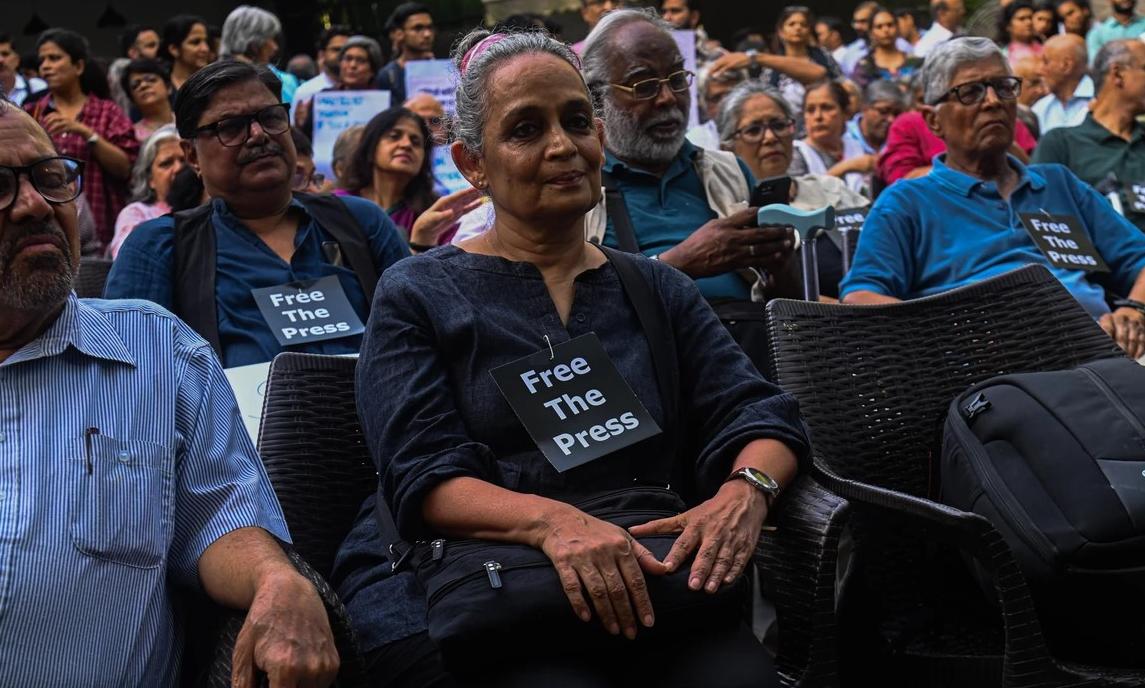
UAPA Against Arundhati Roy: The ‘Act’ of strangling dissent
text_fieldsIndia's democratic fabric has faced significant strain due to the strategic misuse of draconian laws, notably the Unlawful Activities (Prevention) Act (UAPA), which is being widely used to stifle dissent and intimidate those who challenge the status quo, contrary to its original purpose.
The latest approval from the Lieutenant Governor of Delhi to prosecute Booker Prize winner and human rights activist Arundhati Roy under the controversial UAPA law for a speech she allegedly made in 2010 is one of the many cases illustrating how the act is being misused.
She has been a vocal critic of the government on issues such as Kashmir, tribal rights, and social justice. Her forthright comments during a 2010 seminar on Kashmir, advocating for Kashmiri self-determination and condemning state actions, led to charges under the UAPA. Critics cite this as part of an increasing trend by the government to criminalize dissent.
Enacted in 1967 and subsequently amended to expand its scope, the UAPA has become a convenient tool for the government to stifle opposition. The 2019 amendment, in particular, which allows individuals to be designated as terrorists without due process, raises grave concerns about potential abuse.
Roy's prosecution is a glaring example of this misuse, seemingly aimed not at ensuring national security but at silencing a powerful voice of dissent.
The government’s use of the UAPA to prosecute activists like Roy reveals a deliberate strategy to delegitimize dissent. By branding dissenters as terrorists or criminals, the state discredits their voices and instils fear among others who might consider speaking out. This tactic is designed to create an atmosphere where questioning the government is seen as a subversive act, thus stifling healthy democratic discourse.
One of the most insidious aspects of the UAPA is its provision for prolonged detention without the requirement of formal charges or a trial. This effectively allows the state to incarcerate activists for indefinite periods, punishing them without due process. The anguish inflicted upon those detained under this law, often without substantial evidence, is immense. They languish in jail for years, their personal and professional lives irreparably damaged, all while awaiting a trial that may never come.
The UAPA is not merely a legal instrument; it is a tool of psychological warfare. Activists and their families are subjected to relentless surveillance, raids, and harassment. This constant state of intimidation is designed to break their spirits and deter others from joining the fight. The emotional toll of such harassment is profound, leading to a pervasive sense of fear and helplessness among those who dare to resist.
The selective enforcement of the UAPA highlights the political motivations behind its use. Prominent activists, intellectuals, and critics are often the primary targets, chosen for their influential voices and ability to mobilize public opinion. Roy’s prosecution is part of a broader pattern where the state seeks to neutralize perceived threats by singling out individuals who command significant respect and attention.
The rampant misuse of the UAPA to silence dissent has far-reaching implications for India’s democracy. Free speech and the right to dissent are cornerstones of any democratic society. When the government uses laws like the UAPA to stifle these fundamental rights, it undermines the very principles upon which democracy is built. The erosion of these liberties breeds a culture of fear, where citizens are afraid to express their opinions or engage in activism.
The UAPA defines “unlawful activity” as any action intended to disrupt India’s sovereignty, integrity, or security, or to cause disaffection against India. This broad definition can include various forms of expression, from public speeches to written articles and social media posts. Any expression that causes or intends to cause disaffection against India can be labelled as unlawful.
The threat of being labelled a terrorist or facing arrest under UAPA has a chilling effect on free speech. The fear of legal repercussions leads to self-censorship among journalists, activists, and intellectuals, stifling democratic discourse. There is an urgent need for judicial reforms and stringent safeguards to prevent the misuse of UAPA, ensuring that it does not become a weapon for stifling legitimate dissent in a democratic society.
The prosecution of Arundhati Roy under the UAPA is a stark reminder of the lengths to which the Indian government will go to silence dissent. By criminalizing dissent, detaining individuals without trial, and employing tactics of intimidation and harassment, the state seeks to quash any form of opposition.
This is based on the article written by Sreejayaa Rajguru, a law student, published in The Wire






















